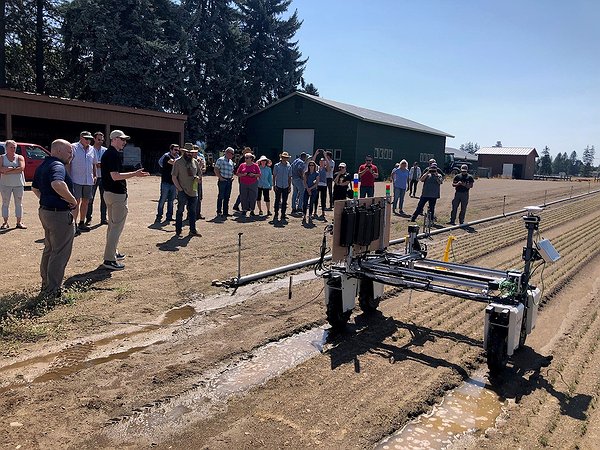Tech meets trees: Robotic weeder tested in N. Idaho forest
HAILEY HILL | Hagadone News Network | UPDATED 1 year, 6 months AGO
COEUR d’ALENE — A robotic device in development at the University of Idaho could help shape the future of nationwide reforestation efforts.
The 3-foot-wide robot, designed by U of I computer science students in partnership with the USDA, uses AI technology to scan for, identify and locate weed growth within a seedling tree nursery. The robot then uses electricity to eradicate weeds, which can hinder growth of seedlings.
A demonstration of the device’s weeding capabilities was recently held at the Coeur d’Alene nursery in front of representatives from all six of the Forest Service’s nurseries located across the country.
“It’s all about sustainability. The robotic device U of I is developing underscores the Forest Service’s commitment to conservation leadership and biological diversity,” said Kas Dumroese, a retired senior research scientist for the U.S. Forest Service who led the initial development of the project. “Autonomous weed eradication will reduce our labor costs and reliance on chemical pesticides and fossil fuels, improving locally adapted plants and strengthening reforestation efforts.”
Currently, the U.S. spends around $500,000 a year to weed national tree seedling nurseries. These nurseries “provide locally adapted plants and seed for reforestation projects, provide an assured source of desirable species and stock types for restoring native ecosystems, and maintain the [USDA]’s position as a conservation leader,” according to the USDA’s Forest Management website.
Though reforestation efforts in National Forest and other federally owned lands receive funding from Congress, the work being done at these seedling nurseries does not — underscoring the significance of the money that would be saved if the robotic weeding robots were implemented permanently. “This is a way to reduce costs, so it’d be a tremendous boost for us,” said nursery superintendent Aram Eramian. “It would certainly help with other maintenance projects and purchasing more supplies.”
While the first demonstration was promising, there is more work to be done before U of I’s weeding robot rolls out nationwide. Planned improvements include weatherizing hardware, improving electrical components and enhancing the weed identification technology.
ARTICLES BY HAILEY HILL

Trouette appealing town hall verdict
Seeks return of security company license
Security company owner Paul Trouette is appealing the revocation of his security agency and security agent licenses following his December conviction on two counts of battery and violations related to security agent uniform and duty requirements, all misdemeanors.

Idaho's first Crunch Fitness to open in Coeur d'Alene
Crunch Fitness is coming to Coeur d'Alene.

Valentine's preparations underway in Coeur d'Alene
With Valentine’s Day less than 48 hours away, Hansen’s Florist and Gifts was bursting with chocolates, stuffed animals, balloons, and flowers. Lots and lots of flowers.



